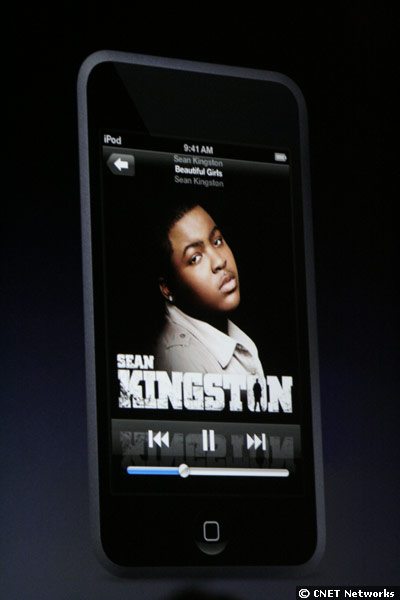Apple's weak growth sister: The iPod?

For years, Apple's story--and much of its stock run--has been about the iPod, its halo effect and the making of Steve Jobs' company as a consumer icon. Funny how perception can change in just a few months.

Here's what we've learned from Munster thus far this week:
- He's sticking to his prediction that Apple will ship 45 million iPhones in calendar 2009 in what could be a home run call or a huge miss;
- The iPhone is out of stock in the 20 stores he has called. That market intelligence led to speculation that a 3G iPhone is coming sooner or later. On the other hand, Apple may be having supply issues. Munster reckons that there's an 80 percent probability that the 3G iPhone is coming. In either case, the news raised a small ruckus, but the evidence seems pretty thin for a real shortage.
- And the Mac is the "most powerful growth engine" for Apple--a conclusion that isn't all that surprising to Apple watchers. Munster expects Macs to continue to gain market share, but is modeling flat market share in calendar year 2008.
Those takeaways get us to the iPod business, which clearly isn't broken, but has been tossed into the corner by analysts obsessed with the latest shiny new object from Apple--the iPhone.
Also see: The anatomy of an iPhone user (and why they want new form factors)
After perusing Munster's note it's clear that the analyst isn't going to throw the iPod overboard, but he expects flat unit growth in 2008.While we do not see the iPod business as a significant growth catalyst, we believe Apple remains positioned to slightly exceed Street estimates in CY08. Specifically, we believe the Street expects iPod unit growth to be about 53m in CY08, essentially flat y/y. We disagree. We believe Apple can maintain iPod unit growth and slightly exceed Street expectations for the full year. While we do not believe the iPod will return to a high growth business (20%+), we do believe it will remain a growing segment (~10%).
In other words, the iPod market is nearing the saturation point. That said Munster holds out hope that Apple's SDK in June will create a bevy of cool applications for the iPod touch. By September, Munster reckons that there will be Wi-Fi enabled iPod touch that will run you less than $200.
Munster's main theme:
In fact, we believe the concept of the iPod will change in the next 12-18 months from a standalone music player to a mobile Internet device that fits in your pocket. We continue to believe there will be standalone music players in the iPod family, but the iPod functionality will be significantly diversified across price points, with additional Wi-Fi enabled models that will likely feature Apple's multi-touch technology.
That call is highly likely. I view the iPod touch as an iPhone without AT&T--or at least that's what it can be if it isn't shackled.
And there's the rub: Munster dutifully noted that there are issues with the iPod roadmap. How does Apple differentiate between the iPhone and iPod? He noted:
One potential issue that the company will be forced to navigate carefully is that the differentiation between the iPod and the iPhone. With a sub-$200 Wi-Fi enabled iPod, the price-to-value equation changes in relation to the iPhone; however, we also expect Apple to release a sub-$300 iPhone in the coming months. Admittedly, the exact way the product lineup will fit together remains unclear. Another issue posed by Wi-Fi enabled iPods is margin pressure from high component costs. iSuppli estimates that the inclusion of a Wi-Fi radio costs Apple roughly $15, and the touch screen display used in the iPhone and iPod touch is roughly $30. For a $149 or $199 iPod, these costs apply margin pressure that will force Apple to innovate around the idea of an Internet connected iPod, which requires a larger screen than current iPod nanos, and an improved user input interface (like multi-touch technology). We believe Apple is developing such solutions that will enable the company to deliver lower cost, Wi-Fi connected iPods in the near future. In turn, this new iPod platform should generate continued growth for the iPod segment of Apple's business.
If Apple can navigate the iPod and iPhone comparison well there's a good chance that the iPod's next iteration will be successful.